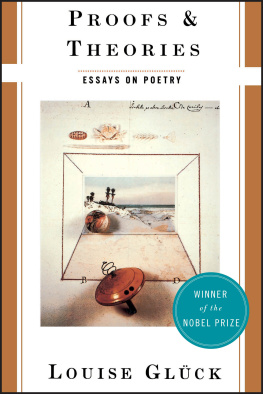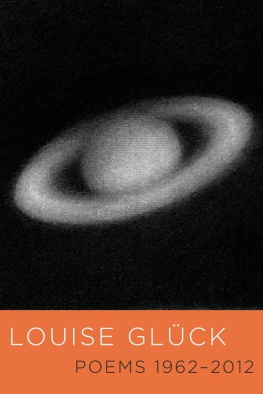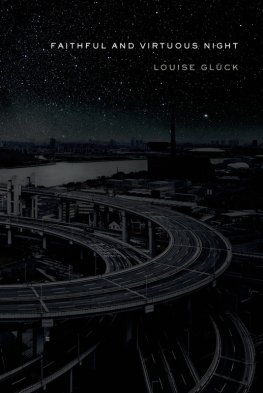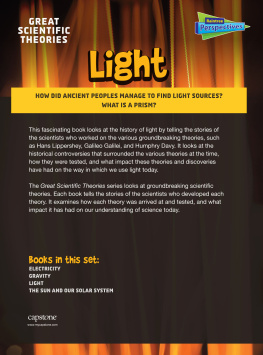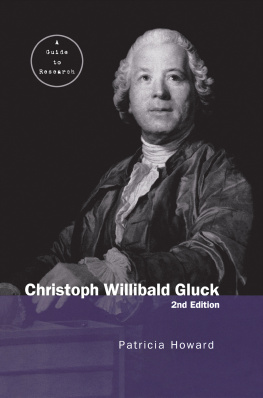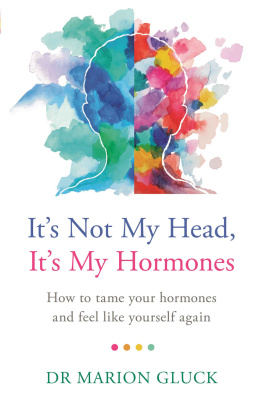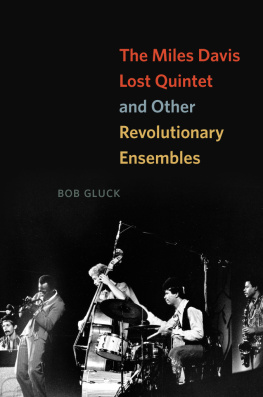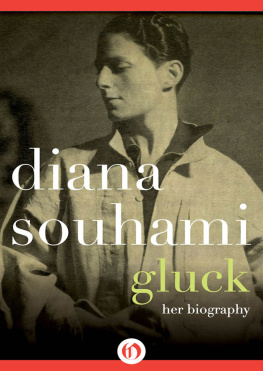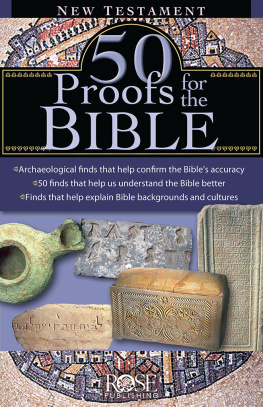Louise Gluck - Proofs & Theories
Here you can read online Louise Gluck - Proofs & Theories full text of the book (entire story) in english for free. Download pdf and epub, get meaning, cover and reviews about this ebook. year: 2021, publisher: HarperCollins, genre: Science. Description of the work, (preface) as well as reviews are available. Best literature library LitArk.com created for fans of good reading and offers a wide selection of genres:
Romance novel
Science fiction
Adventure
Detective
Science
History
Home and family
Prose
Art
Politics
Computer
Non-fiction
Religion
Business
Children
Humor
Choose a favorite category and find really read worthwhile books. Enjoy immersion in the world of imagination, feel the emotions of the characters or learn something new for yourself, make an fascinating discovery.
- Book:Proofs & Theories
- Author:
- Publisher:HarperCollins
- Genre:
- Year:2021
- Rating:3 / 5
- Favourites:Add to favourites
- Your mark:
- 60
- 1
- 2
- 3
- 4
- 5
Proofs & Theories: summary, description and annotation
We offer to read an annotation, description, summary or preface (depends on what the author of the book "Proofs & Theories" wrote himself). If you haven't found the necessary information about the book — write in the comments, we will try to find it.
Proofs & Theories — read online for free the complete book (whole text) full work
Below is the text of the book, divided by pages. System saving the place of the last page read, allows you to conveniently read the book "Proofs & Theories" online for free, without having to search again every time where you left off. Put a bookmark, and you can go to the page where you finished reading at any time.
Font size:
Interval:
Bookmark:
Rendering poetry in a digital format presents several challenges, just as its many forms continue to challenge the conventions of print. In print, however, a poem takes place within the static confines of a page, hewing as close as possible to the poets intent, whether its Walt Whitmans lines stretching to the margin like Route 66, or Robert Creeleys lines descending the page like a string tie. The printed poem has a physical shape, one defined by the negative space that surrounds ita space that is crafted by the broken lines of the poem. The line, as vital a formal and critical component of the form of a poem as metaphor, creates rhythm, timing, proportion, drama, meaning, tension, and so on.
Reading poetry on a small device will not always deliver line breaks as the poet intendedwith the pressure the horizontal line brings to a poem, rather than the completion of the grammatical unit. The line, intended as a formal and critical component of the form of the poem, has been corrupted by breaking it where it was not meant to break, interrupting a number of important elements of the poetic structurerhythm, timing, proportion, drama, meaning, and so on. Its a little like a tightrope walker running out of rope before reaching the other side.
There are limits to what can be done with long lines on digital screens. At some point, a line must break. If it has to break more than once or twice, it is no longer a poetic line, with the integrity that lineation demands. On smaller devices with enlarged type, a line break may not appear where its author intended, interrupting the unit of the line and its importance in the poems structure.
We attempt to accommodate long lines with a hanging indentsimilar in fashion to the way Whitmans lines were treated in books whose margins could not honor his discursive length. On your screen, a long line will break according to the space available, with the remainder of the line wrapping at an indent. This allows readers to retain control over the appearance of text on any device, while also indicating where the author intended the line to break.
This may not be a perfect solution, as some readers initially may be confused. We have to accept, however, that we are creating poetry e-books in a world that is imperfect for themand we understand that to some degree the line may be compromised. Despite this, weve attempted to protect the integrity of the line, thus allowing readers of poetry to travel fully stocked with the poetry that needs to be with them.
Ecco
To Stephen Berg
T he fundamental experience of the writer is helplessness. This does not mean to distinguish writing from being alive: it means to correct the fantasy that creative work is an ongoing record of the triumph of volition, that the writer is someone who has the good luck to be able to do what he or she wishes to do: to confidently and regularly imprint his being on a sheet of paper. But writing is not decanting of personality. And most writers spend much of their time in various kinds of torment: wanting to write, being unable to write; wanting to write differently, being unable to write differently. In a whole lifetime, years are spent waiting to be claimed by an idea. The only real exercise of will is negative: we have toward what we write the power of veto.
It is a life dignified, I think, by yearning, not made serene by sensations of achievement. In the actual work, a discipline, a service. Or, to utilize the metaphor of childbirth which seems never to die: the writer is the one who attends, who facilitates: the doctor, the midwife, not the mother.
I use the word writer deliberately. Poet must be used cautiously; it names an aspiration, not an occupation. In other words: not a noun for a passport.
It is very strange to want so much what cannot be achieved in life. The high jumper knows, at the instant after performance, how high he has been; his achievement can be measured both immediately and with precision. But for those of us attempting dialogue with the great dead, it isnt a matter of waiting: the judgment we wait for is made by the unborn; we can never, in our lifetimes, know it.
The profundity of our ignorance concerning the merit of what we do creates despair; it also fuels hope. Meanwhile, contemporary opinion rushes to present itself as the intelligent alternative to ignorance: our task is to somehow insulate ourselves from opinion in its terminal forms, verdict and directive, while still retaining alert receptiveness to useful criticism.
If it is improper to speak as a poet, it is equally difficult to speak on the subject of education. The point, I think, would be to speak of what has left indelible impressions. But I discover such impressions slowly, often long after the fact. And I like to think they are still being made, and the old ones still being revised.
The axiom is that the mark of poetic intelligence or vocation is passion for language, which is thought to mean delirious response to languages smallest communicative unit: to the word. The poet is supposed to be the person who cant get enough of words like incarnadine. This was not my experience. From the time, at four or five or six, I first started reading poems, first thought of the poets I read as my companions, my predecessorsfrom the beginning I preferred the simplest vocabulary. What fascinated me were the possibilities of context. What I responded to, on the page, was the way a poem could liberate, by means of a words setting, through subtleties of timing, of pacing, that words full and surprising range of meaning. It seemed to me that simple language best suited this enterprise; such language, in being generic, is likely to contain the greatest and most dramatic variety of meaning within individual words. I liked scale, but I liked it invisible. I loved those poems that seemed so small on the page but that swelled in the mind; I didnt like the windy, dwindling kind. Not surprisingly, the sort of sentence I was drawn to, which reflected these tastes and native habit of mind, was paradox, which has the added advantage of nicely rescuing the dogmatic nature from a too moralizing rhetoric.
I was born into the worst possible family given this bias. I was born into an environment in which the right of any family member to complete the sentence of another was assumed. Like most of the people in that family, I had a strong desire to speak, but that desire was regularly frustrated: my sentences were, in being cut off, radically changedtransformed, not paraphrased. The sweetness of paradox is that its outcome cannot be anticipated: this ought to insure the attention of the audience. But in my family, all discussion was carried on in that single cooperative voice.
I had, early on, a very strong sense that there was no point to speech if speech did not precisely articulate perception. To my mother, speech was the socially acceptable form of murmur: its function was to fill a room with ongoing, consoling human sound. And to my father, it was performance and disguise. My response was silence. Sulky silence, since I never stopped wanting deferential attention. I was bent on personal distinction, which was linked, in my mind, to the making of sentences.
In other ways, my family was remarkable. Both my parents admired intellectual accomplishment; my mother, in particular, revered creative gifts. At a time when women were not, commonly, especially well educated, my mother fought to go to college; she went to Wellesley. My father was the first and only son among five daughters, the first child born in this country. His parents had come from Hungary; my grandfather was a better dreamer than administrator of the family land: when the crops failed and the cattle died, he came to America, opened a grocery store. By family legend, a just man, less forceful than his wife and daughters. Before he died, his little store was the last piece of real estate on a block being bought up by one of the Rockefellers. This was generally deemed remarkably good fortune, in that my grandfather could ask, now, any price at allan attitude for which my grandfather had complete contempt. He would ask, he said, the fair price: by definition, the same for Mr. Rockefeller as for anyone else.
Font size:
Interval:
Bookmark:
Similar books «Proofs & Theories»
Look at similar books to Proofs & Theories. We have selected literature similar in name and meaning in the hope of providing readers with more options to find new, interesting, not yet read works.
Discussion, reviews of the book Proofs & Theories and just readers' own opinions. Leave your comments, write what you think about the work, its meaning or the main characters. Specify what exactly you liked and what you didn't like, and why you think so.

